初三英语知识点 初三英语总复习资料
初三英语总复习资料(句子种类和练习题)
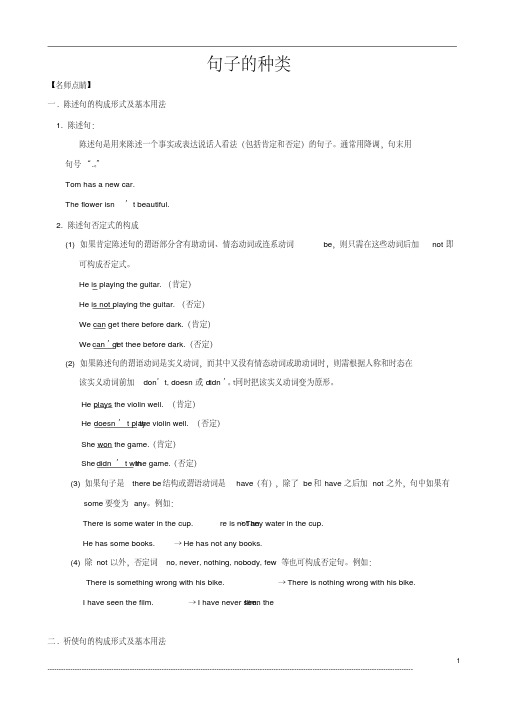
句子的种类【名师点睛】一. 陈述句的构成形式及基本用法1. 陈述句:陈述句是用来陈述一个事实或表达说话人看法(包括肯定和否定)的句子。
通常用降调,句末用。
句号“.”Tom has a new car.The flower isn’t beautiful.2. 陈述句否定式的构成(1) 如果肯定陈述句的谓语部分含有助动词、情态动词或连系动词be,则只需在这些动词后加not即可构成否定式。
He is playing the guitar.(肯定)He is not playing the guitar.(否定)We can get there before dark.(肯定)We can’t get thee before dark.(否定)(2) 如果陈述句的谓语动词是实义动词,而其中又没有情态动词或助动词时,则需根据人称和时态在。
同时把该实义动词变为原形。
该实义动词前加don’t, doesn’t或didn’tHe plays the violin well.(肯定)the violin well.(否定)He doesn’t playShe won the game.(肯定)She didn’t win the game.(否定)(3) 如果句子是there be结构或谓语动词是have(有),除了be和have之后加not之外,句中如果有some要变为any。
例如:There is some water in the cup. →There is not any water in the cup.He has some books. →He has not any books.(4) 除not以外,否定词no, never, nothing, nobody, few等也可构成否定句。
例如:There is something wrong with his bike. →There is nothing wrong with his bike.film.I have seen the film. →I have never seen the二. 祈使句的构成形式及基本用法祈使句是用来表示命令、请求、建议、号召等的句子,谓语动词用原形,句末用感叹号“!”或句号“.”。
初三英语知识点总复习-(全一册)

sb./sth.) 目前,现在 at present
We should do everything we can to protect the environment. 大家知道,没有人喜欢污染。
As we know, none of us likes pollution. 人类逐渐意识到保护动物的重要性。
Humans have come to realize the importance of protecting animals.
month. 那是个有花、有草的美丽的地方。It is a beautiful place with
flowers and grass. 所有的花、草和鱼儿都没有了All the flowers, grass and fish have
gone! 保护环境是我们的职责 It’s our duty to protect the environment.
get lost 丢失 so do I. 我也是。
so do I 与 so I do的区别 so does he 与 so he does 的区别 at the weekend 在周末 hear from 收到……的来信 at least 至少 because of 因为=due to(介) be strict with 对……严格要求 a short time 一会儿 rise to 升到 one fifth 五分之一
it’s our dut设法离开这个地方。Anyway, I hope I’ll
初三英语(全一册)知识点汇总
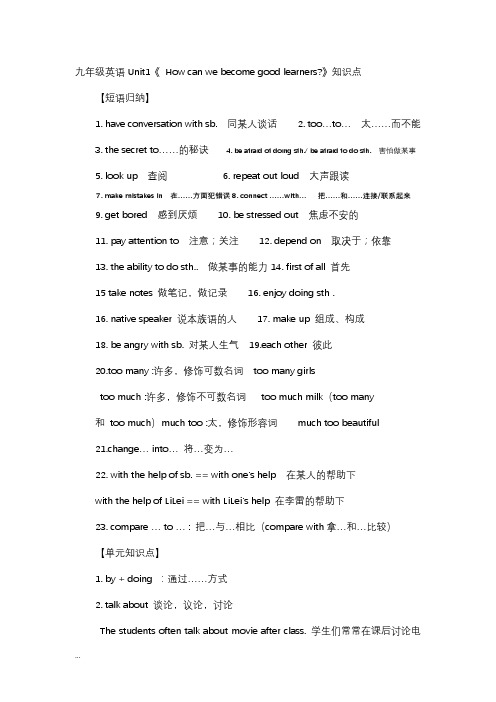
九年级英语Unit1《 How can we become good learners?》知识点【短语归纳】1. have conversation with sb. 同某人谈话2. too…to…太……而不能3. the secret to……的秘诀4. be afraid of doing sth./ be afraid to do sth. 害怕做某事5. look up 查阅6. repeat out loud 大声跟读7. make mistakes in 在……方面犯错误8. connect ……with…把……和……连接/联系起来9. get bored 感到厌烦10. be stressed out 焦虑不安的11. pay attention to 注意;关注12. depend on 取决于;依靠13. the ability to do sth.. 做某事的能力14. first of all 首先15 take notes 做笔记,做记录16. enjoy doing sth .16. native speaker 说本族语的人17. make up 组成、构成18. be angry with sb. 对某人生气 19.each other 彼此20.too many :许多,修饰可数名词 too many girlstoo much :许多,修饰不可数名词 too much milk(too many和 too much)much too :太,修饰形容词 much too beautiful21.change… into…将…变为…22. with the help of sb. == with one's help 在某人的帮助下with the help of LiLei == with LiLei's help 在李雷的帮助下23. compare … to … : 把…与…相比(compare with拿…和…比较)【单元知识点】1. by + doing :通过……方式2. talk about 谈论,议论,讨论The students often talk about movie after class. 学生们常常在课后讨论电影。
初三英语总复习语法讲义
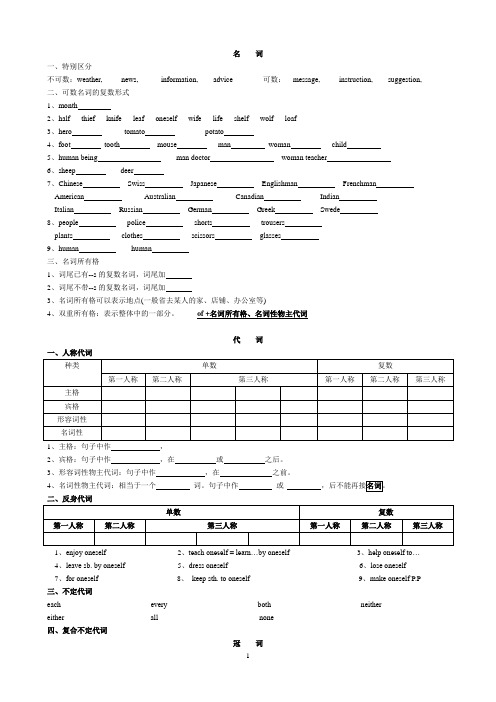
名词一、特别区分不可数:weather, news, information, advice 可数:message, instruction, suggestion,二、可数名词的复数形式1、month2、half thief knife leaf oneself wife life shelf wolf loaf3、hero tomato potato4、foot tooth mouse man woman child5、human being man doctor woman teacher6、sheep deer7、Chinese Swiss Japanese Englishman FrenchmanAmerican Australian Canadian IndianItalian Russian German Greek Swede8、people police shorts trousersplants clothes scissors glasses9、human human三、名词所有格1、词尾已有--s的复数名词,词尾加2、词尾不带--s的复数名词,词尾加3、名词所有格可以表示地点(一般省去某人的家、店铺、办公室等)4、双重所有格:表示整体中的一部分。
of +名词所有格、名词性物主代词代词一、人称代词1、主格:句子中作,2、宾格:句子中作,在或之后。
3、形容词性物主代词:句子中作,在之前。
4、名词性物主代词:相当于一个词。
句子中作或,后不能再接二、反身代词1、enjoy oneself2、teach oneself = learn…b y oneself3、help oneself to…4、leave sb. by oneself5、dress oneself6、lose oneself7、for oneself 8、keep sth. to oneself 9、make oneself P.P三、不定代词each every both neithereither all none四、复合不定代词冠词1、such a/an + adj…. so adj. a/an +…2、quite/rather a/an… a very…3、a/an + adj. + 三餐/天气4、a/an +序数词= another… 。
初三英语复习资料(全套)
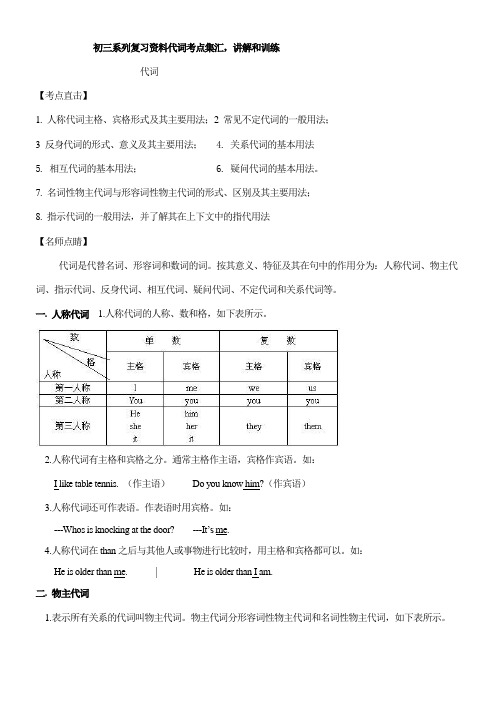
初三系列复习资料代词考点集汇,讲解和训练代词【考点直击】1. 人称代词主格、宾格形式及其主要用法;2 常见不定代词的一般用法;3 反身代词的形式、意义及其主要用法; 4. 关系代词的基本用法5. 相互代词的基本用法;6. 疑问代词的基本用法。
7. 名词性物主代词与形容词性物主代词的形式、区别及其主要用法;8. 指示代词的一般用法,并了解其在上下文中的指代用法【名师点睛】代词是代替名词、形容词和数词的词。
按其意义、特征及其在句中的作用分为:人称代词、物主代词、指示代词、反身代词、相互代词、疑问代词、不定代词和关系代词等。
一. 人称代词 1.人称代词的人称、数和格,如下表所示。
2.人称代词有主格和宾格之分。
通常主格作主语,宾格作宾语。
如:I like table tennis. (作主语)Do you know him?(作宾语)3.人称代词还可作表语。
作表语时用宾格。
如:---Whos is knocking at the door? ---It’s me.4.人称代词在than之后与其他人或事物进行比较时,用主格和宾格都可以。
如:He is older than me. | He is older than I am.二. 物主代词1.表示所有关系的代词叫物主代词。
物主代词分形容词性物主代词和名词性物主代词,如下表所示。
2. 形容词性物主代词的作用相当于形容词,可在句中作定语。
例如:Our teacher is coming to see us.This is her pencil-box.3. 名词性物主代词的作用相当于名词,在句中可用作主语、宾语和表语。
Our school is here, and theirs is there.(作主语)--- Is this English-book yours? (作表语)--- No. Mine is in my bag.I've already finished my homework. Have you finished yours? (作宾语)三. 指示代词指示代词包括:this,that,these,those。
初三英语全部知识点总结大全(建议收藏)

初三英语全部知识点总结大全(建议收藏)1Unit 1 How can we ... learners?【重点短语】1. have conversation with sb. 同某人谈话2. too…to…太……而不能3. the secret to………的秘诀4. be afraid of doing sth./ be afraid to do sth. 害怕做某事5. look up 查阅6. repeat out loud 大声跟读7. make mistakes in 在……方面犯错误8. connect ……with…把……和……连接/联系起来9. get bored 感到厌烦10. be stressed out 焦虑不安的11. pay attention to 注意;关注12. depend on 取决于;依靠13. the ability to do sth.. 做某事的能力【考点详解】1. by + doing 通过……方式(by是介词,后面要跟动名词,也就是动词的ing形式)2. talk about 谈论,议论,讨论The students often talk about movie after class. 学生们常常在课后讨论电影。
talk to sb= talk with sb 与某人说话3. 提建议的句子:①What/ how about +doing sth.? 做…怎么样?(about后面要用动词的ing形式,这一点考试考的比较多)如:What/ How about going shopping?②Why don't you + do sth.? 你为什么不做…?如:Why don't you go shopping?③Why not + do sth. ? 为什么不做…?如:Why not go shopping?④Let's + do sth. 让我们做…...吧。
初三英语必背知识点总结

初三英语必背知识点总结初三英语必背知识点一. 介词by的用法1. 意为“在……旁”,“靠近”。
Some are singing and dancing under a big tree. Some are drawing by the lake.有的在大树下唱歌跳舞。
有的在湖边画画儿。
2. 意为“不迟于”,“到……时为止”。
Your son will be all right by supper time.你的儿子在晚饭前会好的。
How many English songs had you learned by the end of last term?到上个学期末你们已经学了多少首英语歌曲?3. 表示方法、手段,可译作“靠”、“用”、“凭借”、“通过”、“乘坐”等。
The monkey was hanging from the tree by his tail and laughing.猴子用尾巴吊在树上哈哈大笑。
The boy’s father was so thankful that he taught Edison how to send messages by railway telegraph.孩子的父亲是那么的感激,于是他教爱迪生怎样通过铁路电报来传达信息。
4. 表示“逐个”,“逐批”的意思。
One by one they went past the table in the dark.他们一个一个得在黑暗中经过这张桌子。
5. 表示“根据”,“按照”的意思。
What time is it by your watch?你的表几点了?6. 和take , hold等动词连用,说明接触身体的某一部分。
I took him by the hand.我拉住了他的手。
7. 用于被动句中,表示行为主体,常译作“被”、“由”等。
English is spoken by many people.英语被许多人说。
初三英语必考知识点总结归纳
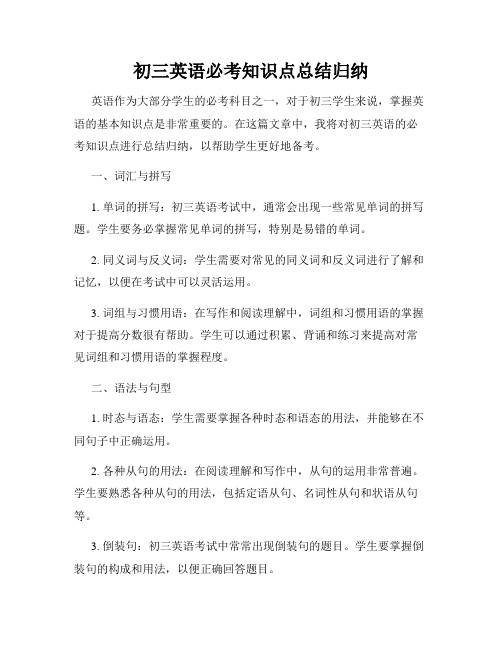
初三英语必考知识点总结归纳英语作为大部分学生的必考科目之一,对于初三学生来说,掌握英语的基本知识点是非常重要的。
在这篇文章中,我将对初三英语的必考知识点进行总结归纳,以帮助学生更好地备考。
一、词汇与拼写1. 单词的拼写:初三英语考试中,通常会出现一些常见单词的拼写题。
学生要务必掌握常见单词的拼写,特别是易错的单词。
2. 同义词与反义词:学生需要对常见的同义词和反义词进行了解和记忆,以便在考试中可以灵活运用。
3. 词组与习惯用语:在写作和阅读理解中,词组和习惯用语的掌握对于提高分数很有帮助。
学生可以通过积累、背诵和练习来提高对常见词组和习惯用语的掌握程度。
二、语法与句型1. 时态与语态:学生需要掌握各种时态和语态的用法,并能够在不同句子中正确运用。
2. 各种从句的用法:在阅读理解和写作中,从句的运用非常普遍。
学生要熟悉各种从句的用法,包括定语从句、名词性从句和状语从句等。
3. 倒装句:初三英语考试中常常出现倒装句的题目。
学生要掌握倒装句的构成和用法,以便正确回答题目。
三、阅读理解1. 短文理解:学生需要培养阅读理解的能力,掌握通过阅读短文来获取信息的技巧。
2. 推理判断与推理理解:在阅读理解中,常常会有一些需要学生进行推理判断和推理理解的题目。
学生要培养这方面的能力,掌握正确的解题思路。
四、写作1. 写作基础知识:学生需要掌握常用的句型、词汇和语法知识,以便能够进行基本的书面表达。
2. 作文写作:在写作方面,学生需要掌握写作的基本结构和写作技巧,例如如何组织好段落、如何表达自己的观点等。
五、听力技巧1. 听力材料理解:学生需要培养听力材料理解的能力,掌握听力题目的解题技巧。
2. 笔记做题:学生可以尝试在听力过程中做笔记,以便更好地理解和记录听力内容。
六、口语表达1. 语音语调:学生需要正确认识和掌握英语的语音语调,以便能够准确地表达自己的意思。
2. 口语练习:学生可以通过模仿、跟读和对话等方式来提高口语表达的能力。
- 1、下载文档前请自行甄别文档内容的完整性,平台不提供额外的编辑、内容补充、找答案等附加服务。
- 2、"仅部分预览"的文档,不可在线预览部分如存在完整性等问题,可反馈申请退款(可完整预览的文档不适用该条件!)。
- 3、如文档侵犯您的权益,请联系客服反馈,我们会尽快为您处理(人工客服工作时间:9:00-18:30)。
初三英语知识点初三英语总复习资料初中语法项目表( 加“*”号的项目只要求理解)1. 词类:1)名词2)形容词3)副词4)动词5)代词6)冠词7)数词8)介词9)连词10)感叹词*2. 构词法:1)合成法classroom, something, reading-room2)派生法worker, drawing, quickly, careful, kindness,cloudy, unhappy3)转化法hand (n. )—hand (v. )dry ( adj. )—dry ( v. )3. 名词1)可数名词和不可数名词2)名词的复数3)专有名词4)所有格4. 代词1)人称代词的主格和宾格形式2)物主代词的形容词与名词性形式3)反身代词myself, himself, ourselves, etc.4)指示代词this, that, these, those5)不定代词some, any, no, etc.6)疑问代词what, who, whose, which, etc.5. 数词基数词和序数词6. 介词词汇表中所列介词的基本用法7. 连词词汇表中所列连词的基本用法8. 形容词1)作定语、表语、宾语补足语的基本用法2)比较等级( 原级、比较级、最高级)的基本用法( 1)构成-er, -est; more, the most( 2)基本句型as+原级形式+as. . .not as ( so)+原级形式+as. . .比较级形式+than. . .the+最高级形式+. . . in ( of). . .9. 副词1)表示时间、地点、方式、程度等的基本用法2)疑问副词when, where, how3)比较等级( 原级、比较级、最高级)( 1)构成-er, -est; more, the most( 2)基本句型as+原级形式+as. . .not as ( so)+原级形式+as. . .比较级形式+than. . .the+最高级形式+. . . in ( of). . .*10. 冠词一般用法11. 动词*1)动词种类( 1)行为动词或实义动词1及物动词2不及物动词( 2)连系动词be, look, turn, get, become, etc.( 3)助动词be, do, have, shall, will, etc.( 4)情态动词can, may, must, need, etc.2)时态( 1)一般现在时I get up at six o'clock every morning.He doesn't speak Russian.They are very busy.The moon moves round the earth.When you see him, tell him to come to my place.I'll go to see you tonight if I'm free.( 2)一般过去时I was in Grade One last year.I got up at five yesterday.( 3)一般将来时1. shall ( will)+动词原形I shall ( will) go to your school tomorrow afternoon.She will be here tomorrow.2. be going to+动词原形I'm going to help him.( 4)现在进行时We're reading the text now.They're waiting for a bus.( 5)现在完成时I have already posted the letter.They have lived here for ten years.*( 6)过去进行时We were having a meeting this time yesterday.The teacher was talking to some parents when I saw her.*( 7)过去完成时We had learned four English songs by the end of last year. The film had already begun when I got to the cinema.She said that she had not heard from him since he left Beijing. *( 8)过去将来时He said he would go to the cinema that evening.Betty said she was going to visit her uncle next Sunday.3)被动语态( 1)一般现在时的被动语态English is taught in that school.( 2)一般过去时的被动语态The song was written by that worker.( 3)一般现在时带情态动词的被动语态She must be sent to hospital at once.4)动词不定式*( 1)作主语To learn a foreign language is not easy.It is not easy to learn a foreign language.( 2)作宾语They began to read.( 3)作宾语补足语Jim asked me to help him with his lessons.We often heard her sing.*( 4)作定语I have an important meeting to attend.( 5)作状语She went to see her grandma yesterday.( 6)用在how, when, where, what, which等之后I don't know how to use a computer.Do you know when to start?He didn't know what to do next.12. 句子种类1)陈述句( 肯定式和否定式)2)疑问句( 一般疑问句、特殊疑问句、选择疑问句、反意疑问句)3)祈使句( 肯定式和否定式)*4)感叹句*13. 句子成份1)主语Betty likes her new bike.He gets up early every day.To learn a foreign language is not easy.2)谓语We work hard.The boy caught a bird.He is my brother.They all look fine.3)表语Her sister is a nurse.It's me.I'm ready.He got angry.We were at home last night.His cup is broken.4)宾语Tom bought a story-book.I saw him yesterday.He wanted to have a cup of tea.5)直接宾语和间接宾语He gave me some ink.Our teacher told us an interesting story.6)宾语补足语Call her Xiao Li.You must keep the room clean.John asked me to help him.7)定语This is a green jeep.This is an apple tree.Are these students your classmates?Winter is the coldest season of the year.I have something to tell you.8)状语You are quite right.She will arrive in Beijing on Monday.He stopped to have a look.14. 简单句的五种基本句型第一种主语+连系动词+表语( S+V+P)The bike is new.The map is on the wall.第二种主语+不及物动词( S+V)He swims.第三种主语+及物动词+宾语( S+V+O)Children often sing this song.第四种主语+及物动词+间接宾语+直接宾语( S+V+IO+DO) She showed her friends all her pictures.第五种主语+及物动词+宾语+宾语补足语( S+V+O+C)We keep our classroom clean and tidy.15. 并列句He likes maths, but he needs help.I help him and he helps me.16. 复合句1)宾语从句He said ( that) he felt sick.I don't know whether ( if) she still works in the factory.I take back what I said.I can't tell who is there.Can you tell me where the Summer Palace is?2)状语从句The train had left when I got to the station.I'll go with you to the cinema this afternoon if I'm free.The students went to the farm because the farmers needed some help.The earth is bigger than the moon.He was so tired that he couldn't walk on.*Jack worked hard so that he might get a good job.Doctor Wang went to the hospital though it rained heavily.*3)定语从句Find the girl who is wearing a red skirt.Show me the picture that you like best.Colour the birds which ( that) are flying.。
